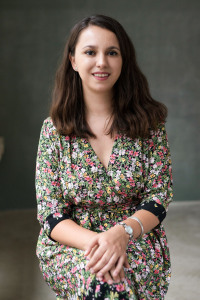Kicheva Group
Tissue Growth and Developmental Pattern Formation
Individuals of the same species can differ widely in size, but their organs have reproducible proportions and patterns of cell types. This requires coordination between tissue growth and the generation of diverse cell types during development. The Kicheva group studies how this coordination is achieved in the vertebrate neural tube, the embryonic precursor of the spinal cord and brain.
Neural tube development is controlled by signaling molecules called morphogens, which are produced at the opposite poles of the tissue and spread to form gradients of concentration. Cells interpret morphogen signaling to determine their position and cell fate within the neural tube. Morphogens also control tissue growth by influencing the decisions of cells to divide or exit the cell cycle, but the exact mechanisms are unknown. The Kicheva group is aiming to better understand how morphogen gradients form in a growing tissue, how morphogen signaling is interpreted by cells to regulate tissue growth and how this is coordinated with the formation of tissue pattern.
The group studies these questions by focusing on neural tube development in mouse and chick and combining in vivo assays with in vitro differentiation of mouse stem cells and organoids. They use mathematical modeling to relate their experiments to theoretical frameworks.
Team
Current Projects
Morphogen gradient formation | Integration of multiple morphogen inputs | Control of tissue growth
Publications
Guerrero P, Perez-Carrasco R, Zagórski MP, Page D, Kicheva A, Briscoe J, Page KM. 2019. Neuronal differentiation influences progenitor arrangement in the vertebrate neuroepithelium. Development. 146(23), dev176297. View
Zagórski MP, Tabata Y, Brandenberg N, Lutolf M, Tkačik G, Bollenbach T, Briscoe J, Kicheva A. 2017. Decoding of position in the developing neural tube from antiparallel morphogen gradients. Science. 356(6345), 1379–1383. View
Kicheva A, Bollenbach MT, Ribeiro A, Pérez Valle H, Lovell Badge R, Episkopou V, Briscoe J. 2014. Coordination of progenitor specification and growth in mouse and chick spinal cord. Science. 345(6204), 1254927. View
ReX-Link: Anna Kicheva
Open positions
The group is open to outstanding postdoc and student applicants interested in working on tissue growth control in vertebrate development. Candidates with background in developmental, cell or molecular biology or at the interface between biophysics and biology are encouraged to apply. For further information about the research topics in the lab, click here. If you are interested in applying, please email anna.kicheva@ist.ac.at with your CV, motivation letter and contact details of 2-3 referees.
Career
Since 2024 Professor, Institute of Science and Technology Austria (ISTA)
2015 – 2024 Assistant Professor, Institute of Science and Technology Austria (ISTA)
2008 – 2015 Postdoc, National Institute for Medical Research (The Francis Crick Institute), UK
2008 PhD, University of Geneva, Switzerland and Max Planck Institute of Cell Biology and Genetics, Dresden, Germany
Selected Distinctions
2022 ERC Consolidator Grant
2020 SFB grant “Stem cell modulation in neural development and regeneration”
2017 Austria/Bulgaria scientific and technological cooperation (WTZ) grant
2015 ERC Starting Grant
2009 Marie-Curie Intra-European Fellowship
2008 FEBS Long-term Fellowship












